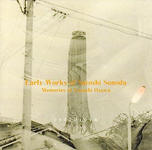|
|
 |
Dusted Reviews
Artist: Satoshi Sonoda Album: Early Works of Satoshi Sonoda: Memories of Yasushi Ozawa Label: PSF Review date: May. 15, 2009 |

|
|
|
 |
As a general rule, I think we can all agree that tribute albums are not a good thing. Somehow the idea of demonstrating a songwriter’s genius by recording invariably inferior versions of his or her songs has never made a lot of sense. Thankfully, this CD is not a tribute per se; in fact, the artist in question doesn’t even appear on many of the songs. Instead, this is just what it says: an evocation of memories. These early recordings by guitarist Satoshi Sonoda are his way of recognizing the impact that Yasushi Ozawa had on his life: "to document precisely the kind of sound-world that was invoked in my through my meeting with Yasushi Ozawa," as the liner notes say.
Ozawa was a longtime fixture of Tokyo’s avant scene whose passing last year at the age of 50 was a sad surprise. While best known for his role as bassist in Keiji Haino’s out-rock band Fushitsusha, he was a participant since the 70s in groups such as East Bionic Symphonia, Marginal Consort, and many others. I was fortunate enough to meet him on a few occasions and he was a quiet, self-possessed artist.
The notes in the booklet are filled with reminiscences by Sonoda of the late 70s scene in Tokyo. Legendary venues like Kichijoji’s Minor and Meidaimae’s Kid Ailack Hall are mentioned together with people like reed player Takashi Miura, and members of Gaseneta and East Bionic Symphonia. The biographical notes are also a fine contemplation of the changes in life that can be caused by meeting a single person -- in this case, Ozawa’s influence on Sonoda’s life through introducing him to people, places, and sounds.
The seven tracks are taken from five sessions, all recorded live in 1977 and ‘78. Stylistically there’s a lot of variation, from the opening "Free Music Space 1" and its slow, spacey psych to rough folk to free scronk. The two longest pieces, "Free Music Revolt (Rehearsal)" and "Free Music Space 6", are free-form jams that cover a lot of territory. The former includes Ozawa on bass, Mitsuhiro Ueda on drums, and Seigo Nakane on violin, and progresses from an initial spacey scrapiness through sparse, near-silent moments to an intriguing rhythmic segment based around a repeating bass and pizzicato violin motif, with a slow guitar lead over the top. From there it gets crazier and more abstract. "Free Music Space 6" closes the CD with twenty minutes of free-form plunk and squeak, squawk and howl, featuring a large cast of characters including Chie Mukai and Takashi Miura. The three ANARkISS songs, live at Minor in 1977, are quite different, raw punky emotions and rough folk-strum and free-spazz, including a version of Kan Mikami’s "Piss-soaked Lake", a song with special meaning for Sonoda as explained in the liner notes.
I think that Sonoda wisely and correctly recognized that the greatest tribute to Ozawa would be to recognize and affirm the sort of personal impact he had on the world. This document reconstructs, to some extent, the milieu of thirty years ago and places Ozawa with Sonoda and others as they experiment with the time’s musical possibilities. To quote again from the liner notes: "It is also an attempt, as Ozawa put it, to take this world you’ve encountered, and throw it back at one you have yet to encounter." We’re in the latter, and fortunate to have the opportunity to listen to the former.
By Mason Jones
|







